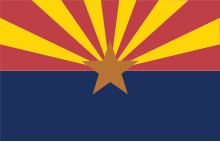Updated: 10/1995
Status: Permitted, subject to federal statute.
Statute
 Arizona Title 4, Chapter 1, Article 1, § 4-101(2) defines beer as any beverage obtained by the alcoholic fermentation, infusion or decoction of barley malt, hops, or other ingredients not drinkable, or any combination of them. In addition subpart (30) provides that “Spirituous liquor” includes alcohol, brandy, whiskey, rum, tequila, mescal, gin, wine, porter, ale or BEER, any malt liquor, malt beverage, absinthe or compound or mixture of any of them, or of any of them with any vegetable or other substance, alcohol bitters, bitters containing alcohol, and any liquid mixture or preparation, whether patented or otherwise, which produces intoxication, fruits preserved in ardent spirits, and beverages containing more than one-half of one per cent of alcohol by volume.
Arizona Title 4, Chapter 1, Article 1, § 4-101(2) defines beer as any beverage obtained by the alcoholic fermentation, infusion or decoction of barley malt, hops, or other ingredients not drinkable, or any combination of them. In addition subpart (30) provides that “Spirituous liquor” includes alcohol, brandy, whiskey, rum, tequila, mescal, gin, wine, porter, ale or BEER, any malt liquor, malt beverage, absinthe or compound or mixture of any of them, or of any of them with any vegetable or other substance, alcohol bitters, bitters containing alcohol, and any liquid mixture or preparation, whether patented or otherwise, which produces intoxication, fruits preserved in ardent spirits, and beverages containing more than one-half of one per cent of alcohol by volume.
Discussion
Section 4-226(b) provides an exception for those authorized to procure spirituous liquor or ethyl alcohol tax-free, as provided by the acts of Congress and regulations promulgated thereunder. In short, this subsection allows the home manufacture of beer for personal use as provided for by federal statute.
Special Provisions
Section 4-221 mandates that any still or apparatus used for the distillation or for the production of spirits or alcohol be registered with the state ABC director.
State Alcohol Beverage Control Agency
Department of Liquor Licenses and Control
- 800 Washington Street, Suite 500
- Phoenix, AZ 85007
- Phone: 602.542.5141
- Fax: 602.542.5707
Applicable Statutory Material
§ 4-101. Definitions In this title, unless the context otherwise requires:
2. “BEER” means any beverage obtained by the alcoholic fermentation, infusion or decoction of barley malt, hops, or other ingredients not drinkable, or any combination of them.
30. “Spirituous liquor” includes alcohol, brandy, whiskey, rum, tequila, mescal, gin, wine, porter, ale or BEER, any malt liquor, malt beverage, absinthe or compound or mixture of any of them, or of any of them with any vegetable or other substance, alcohol bitters, bitters containing alcohol, and any liquid mixture or preparation, whether patented or otherwise, which produces intoxication, fruits preserved in ardent spirits, and beverages containing more than one-half of one per cent of alcohol by volume.
§ 4-221. Registration of stills; forfeiture; sale; proceeds
A. Every person having in his possession or custody or under his control a still or distilling apparatus shall register it with the director under the rules the director may prescribe, and every still or distilling apparatus not so registered, together with all mash, wort or wash, for distillation or for the production of spirits or alcohol, and all finished products, together with all personal property in the possession or custody of, or under the control of any person, which may be used in the manufacture or transportation of spirituous liquors, and which is found in the building or in any yard or enclosure connected with the building in which the unregistered still or distilling apparatus is located, shall be forfeited to the state.
§ 4-226. Exemptions The provisions of this title do not apply to:
1. Drugstores selling spirituous liquors only upon prescription.
2. Any confectionery candy containing less than five per cent by weight of alcohol.
3. Ethyl alcohol intended for use or used for the following purposes:
(a) Scientific, chemical, mechanical, industrial and medicinal purposes.
(b) Use by those authorized to procure spirituous liquor or ethyl alcohol tax-free, as provided by the acts of Congress and regulations promulgated thereunder.
(c) In the manufacture of denatured alcohol produced and used as provided by the acts of Congress and regulations promulgated thereunder.
(d) In the manufacture of patented, patent, proprietary, medicinal, pharmaceutical, antiseptic, toilet, scientific, chemical, mechanical and industrial preparations or products, unfit and not used for beverage purposes.
(e) In the manufacture of flavoring extracts and syrups unfit for beverage purposes.
Note: The information presented here is to the best of our knowledge and should not be used as a substitute for legal advice specific to the laws of your state.

Share Post